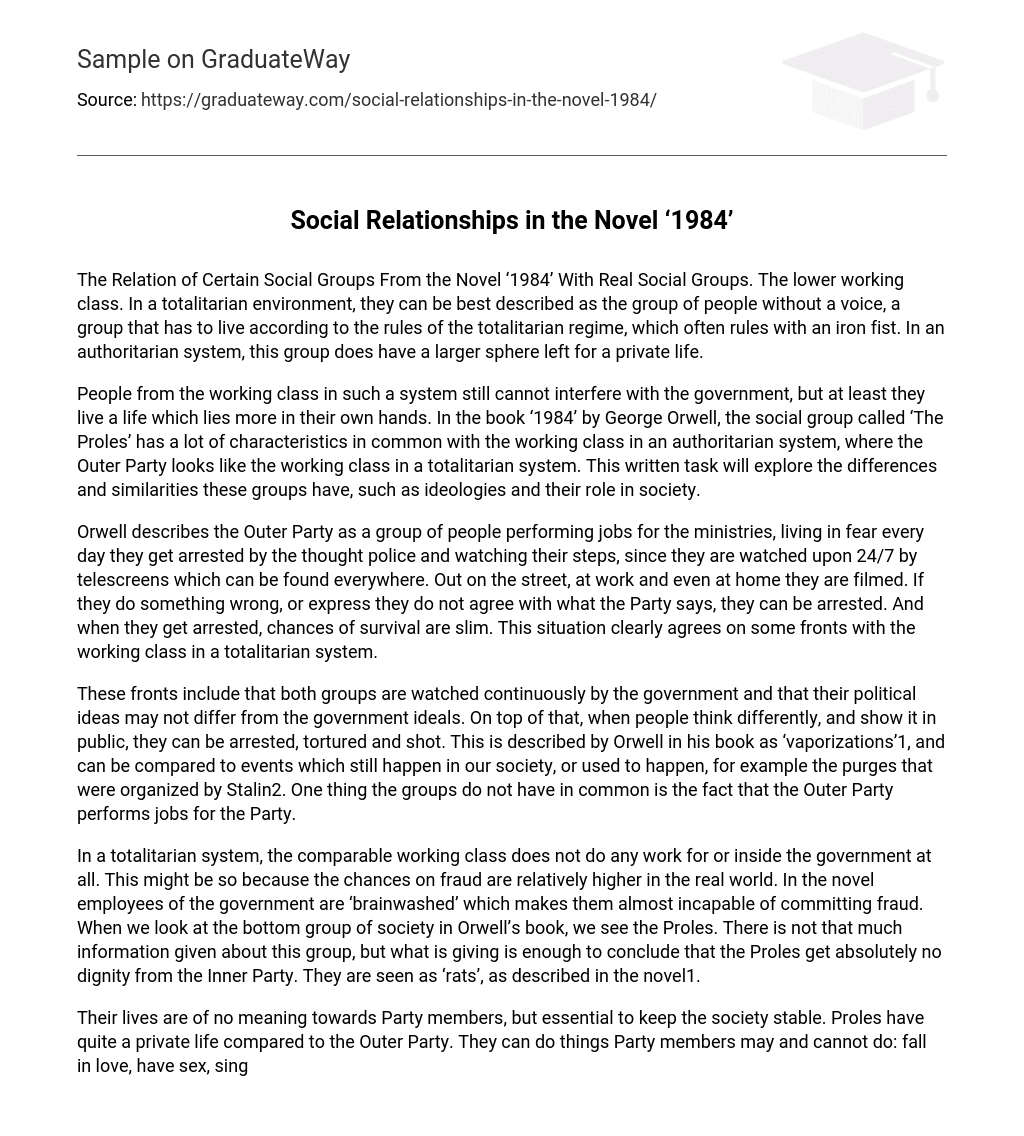The lower working class in the novel ‘1984’ can be equated to a real social group in a totalitarian environment. They are individuals who lack a voice and must conform to the rules of the regime that governs with a heavy hand. However, within an authoritarian system, this group retains a slightly greater degree of autonomy in their personal lives.
In an authoritarian system, people from the working class are unable to intervene in the government, but they do have more control over their own lives. The Proles in George Orwell’s ‘1984’ and the working class in a totalitarian system share many similarities. Meanwhile, the Outer Party represents the working class in a totalatarian system. The goal of this written task is to examine the distinctions and similarities between these groups, including their ideologies and societal roles.
Orwell portrays the Outer Party as individuals engaged in various roles within the ministries, constantly living in a state of apprehension, fearing arrest by the thought police. They must be cautious in their actions and words, as they are under constant surveillance by ubiquitous telescreens that pervade their streets, workplaces, and even homes. Disobeying or expressing dissent towards the Party can result in detention, with survival prospects being bleak. This scenario evidently mirrors certain aspects of the proletarian community within a totalitarian regime.
Both groups, the Outer Party and the Proles, face constant government surveillance and their political beliefs must align with the government’s ideals. Additionally, expressing dissenting opinions in public can lead to arrest, torture, and even death, as described by Orwell in his book as ‘vaporizations’. These events can be likened to historical occurrences such as Stalin’s purges. However, one distinction between the two groups is that the Outer Party fulfills work duties for the Party.
In a totalitarian system, the working class in comparable positions does not engage in any government work or work within the government. This may be because the risk of fraud is relatively higher in reality. In the novel, government employees are ‘brainwashed’, rendering them almost incapable of committing fraud. Examining the lowest social group in Orwell’s book, we encounter the Proles. Though there is limited information provided about this group, the available details suggest that the Proles receive no dignity from the Inner Party. They are portrayed as ‘rats’, as described in the novel1.
Party members do not consider the lives of Proles as significant, though they are crucial for maintaining societal stability. The Proles enjoy more privacy in comparison to the Outer Party and have the freedom to engage in actions forbidden for Party members, such as falling in love, having sex, and singing songs. Most notably, unlike Party members who are constantly monitored by the government, the Proles are not subject to surveillance through telescreens in their homes. As a result, if they desired, they could freely express their opinions; however, their belief that the government is superior prevents them from having any alternative perspective. The information the Proles receive from newspapers or television is either censored or fabricated by the party.
The Party’s creations – poems, songs, and pornographic material – are consumed by the people. They indulge in Party-provided gin, coffee, and chocolate. However, despite adequate supply, the quality of these goods is poor.
In relation to literature, the presence of real coffee and chocolate can be obtained through the black market. This kind of situation resembles that of the working class in an authoritarian regime, wherein economic establishments that are not regulated by the government are permitted. Hence, the possibility of a black market existing cannot be disregarded.
In addition, authoritarian systems include social groups that are not subject to the strict regime, similar to the Proles. Although the government of an authoritarian system may view the working class negatively, they rely on them to perform essential services such as working in mines or undertaking dirty work that high-ranking government officials refuse to do. Orwell provides a clear ideology for the Outer Party in his novel, which is reflected in their slogan: ‘War is Peace, Freedom is Slavery, Ignorance is Strength’.
The concept of the thirty minutes of hate in which their leader, ‘Big Brother,’ is obeyed, aligns with the idea of a political leader. This aligns with how the government is worshipped or obeyed in a totalitarian system. To illustrate, a comparison can be drawn between Big Brother and Hitler, and the slogan to Hitler’s: ‘Ein Volk, ein Reich, ein Fuhrer.’ In contrast, the Proles do not have a political ideology or a real political leader whom they must obey to the same extent as Outer Party members.
This text argues that an authoritarian system aligns more with the functioning described in Orwell’s book, where there is no clear political ideology. Orwell envisions a society in which the government operates freely and counter-government groups struggle to gain traction. From this analysis, it can be inferred that Orwell believes a combination of totalitarian and authoritarian governance is the key to achieving this nearly perfect society portrayed in his book.
The focus of this written task is on Orwell’s portrayal of the social groups ‘The Proles’ and the members of the Outer Party in his novel ‘1984’. It argues that the roles played by these groups in the author’s created society align with the roles of the working classes in an authoritarian and totalitarian political system. The task delves into the similarities between the Proles and the working class in an authoritarian system, as well as those between the members of the Outer Party and the working class in a totalitarian system.





